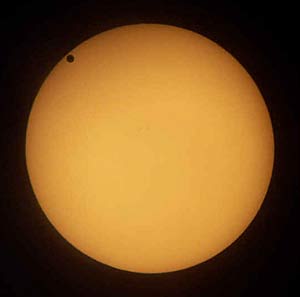Kepler in the classroom
| 03 March 2009
BERKELEY — Just as NASA's Kepler mission and its search for habitable planets has grabbed the public's attention, Alan Gould hopes it will galvanize student interest in science as well.
Since 2001, Gould, coordinator of the Lawrence Hall of Science (LHS) space science programs, has been gearing up for launch as Kepler's co-investigator for education and public outreach. Working with the SETI Institute in Mountain View, Calif., he has developed educational curricula that teachers can use to harness students' interest in the mission to learn not only about extrasolar planets, but about the solar system as well.
 Just as Venus occasionally passes between Earth and the sun, distant planets occasionally pass between their star and us. Kepler will be able to detect such transits. (NASA photo)
Just as Venus occasionally passes between Earth and the sun, distant planets occasionally pass between their star and us. Kepler will be able to detect such transits. (NASA photo)As coordinator of the Kepler mission's website, Gould also has helped provide the public with a wealth of information on the mission and given teachers a smorgasbord of class activities. And through teacher workshops, he and his LHS colleagues have promoted astronomy and space science in elementary, middle and high school classrooms through the hall's well-established GEMS (Great Explorations in Math and Science), FOSS (Full Option Science System), GSS (Global Systems Science) and HOU (Hands on Universe) programs.
"Kepler is supporting these educational outreach projects, but these projects are providing Kepler with huge leverage as a way of reaching a lot of teachers," he said. "That was a very strong element of our education proposal to NASA."
Among other offerings are a planetarium show, "Strange Planets," that LHS planetarium staff developed for use in science museums around the world; and a transiting planet demonstration that is part of "Alien Earths," a larger museum exhibit developed by the Space Science Institute of Boulder, Colo. The exhibit premiered at LHS four years ago and is now on a national tour.
Gould also worked with Allan Ayres of LHS to design a solar system model, called an orrery, that kids can build with LEGOs.
Throughout the process, Gould has been welcomed as a full member of the Kepler team, and this week he is participating in the prelaunch science team meeting in Florida prior to Friday's launch at Cape Canaveral.
"This has been very exciting, very rewarding," Gould said. "The mission is really supportive of education and public outreach; we're invited to all science team meetings and we make presentations to the science team. The appreciation for education this mission has is amazing."
In particular, Gould praised David Koch of NASA Ames Research Center. He is not only deputy principal investigator for Kepler, but also a member of the education and outreach team. "He really dives into it - gets his hands dirty in the education realm."
For Gould, it has been exhilarating to be associated with a NASA mission that has such historic goals.
"The most amazing part of this is, for the first time in human history we will have real data to answer the age-old question: Are there really planets out there like ours and how many of them might there be?" he said.

